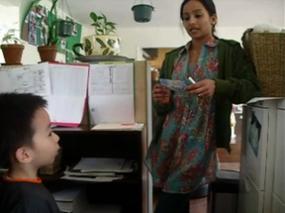Arthur Knows What's Fair

Context: Please appreciate that this episode comes at the height of a four-week focus at this school on justice and fairness. The strategies the teachers used during this period, including this episode with Arthur, were experimental and the teachers are currently discussing their value. We invite you to join their critique.
Arthur, in his fourth year, was present when the school director gave Miss Maria money to buy stickers for the writing corner. Arthur clearly wants Miss Maria to buy the stickers. But Miss Maria takes this opportunity to present alternative uses of the money to see how Arthur will react. Arthur understands that some things can be changed, such as the day Miss Maria goes downtown to buy the stickers if she cannot go right now (“Go tomorrow.” he says.) or if she is too busy to go tomorrow (“Go buy the stickers on Saturday”). But the contract for the money’s use had been set. When Miss Maria says she thinks she will use the money to buy something else, Arthur clearly states, “But this money is only for buying stickers.”
Miss Maria continues with an idea of using the money to buy Mr. Tony a coffee. Arthur, not to be undone, suggests that Miss Maria buys the stickers on Sunday, perhaps thinking the problem was still the time of purchase or maybe he was deflecting the discussion back to when to buy rather than what to buy. After all, if he was being so conciliatory about waiting until Sunday for the purchase, then shouldn’t that offer be honored?
Realizing that she has been a little too unilateral about changing her mind, Miss Maria asks Arthur if it is fair for her to spend the money on coffee. Once again Arthur shows his openness to possibilities, but not ones that include buying something other than the stickers. He states that this money, in particular, has been designated as the “stickers money” but Miss Maria could use “other money to buy coffee. “
In the end everyone reviews that the money came from the director to buy stickers for Arthur to use. And Miss Maria agrees with Mr. Tony that she can use her own money to buy him a coffee.
To take one perspective, this episode shows that even young children have a strong sense of verbal contracts. We are not quite sure if Arthur would have been so principled were the money to be spent for something of less interest to Arthur. But given the quickness and firmness of his position it is likely that he was using a principle of fairness. One does not go back on a promise. You can change the means to the promise, but not the consequence. We expect his next step will be to consider what conditions would make a change of mind fair, such as an emergency or some other higher need for the money than coffee.
Do you think this episode helped Arthur think about these issues of fairness? We accept that the video helps us know how Arthur thinks, and that is important. But given that this provocation was somewhat staged, and was at times rather unilateral, what will be the take away for Arthur? It could be Arthur felt outnumbered by the three teachers. Or it could be that the utter unfairness of this dominance caused him to rally around his principles. Do you believe confrontations that have this emotional charge to them could generate more serious thinking about fairness, perhaps more nuanced and earnest than happens when children read a story about fairness followed by a discussion? We know this episode is controversial. That is why we offer it to you. Please enter your comments in our blog at www.videatives.com so that we can “closely map” our judgments onto the specifics actions in this video.
